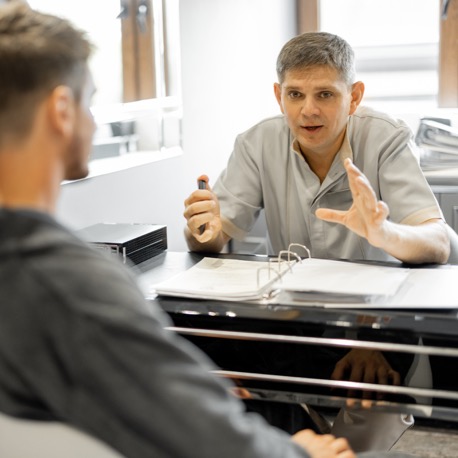Understanding Addiction and Its Impact on Families
Addiction isn’t a choice or a moral failing—it’s a complex condition that affects the entire family system. For families in Northern Virginia, recognizing this truth is often the first step toward healing. At New Paradigm Recovery, we understand that addiction isn’t something your loved one faces alone. Families embark on their own emotional journey, often filled with confusion, hurt, worry, and hope.
Recognizing When Your Loved One Needs Help
Identifying addiction in a loved one can be difficult, especially when they seem to function well at work or deny that anything is wrong. Often, the signs are subtle at first: increasing substance use, changes in mood or behavior, withdrawal from family life, financial concerns, or shifts in appearance and sleep habits. Many families describe not a single moment of realization, but a gradual understanding that something isn’t right.
If your instincts tell you something is off, trust them. You know your child best.
Starting the Conversation
Bringing up concerns about addiction can feel overwhelming. Choose a calm, private moment and speak from a place of compassion. Share what you’ve noticed and how you feel, using “I” statements to avoid sounding accusatory. Be ready to listen as much as you talk—and understand that denial or defensiveness may be part of the initial response.
The goal of the first conversation isn’t to solve everything—it’s to plant a seed. Let your loved one know that you’re here, you care, and you’re ready to support them in seeking help.
Your Role in the Recovery Process
Families play a vital role in the recovery journey, though understanding exactly what that role looks like can be challenging. Supporting your loved one doesn’t mean shielding them from consequences. In fact, learning the difference between support and enabling is crucial. Emotional support, consistency, and healthy boundaries are more helpful than attempting to control or rescue.
It’s also important to take care of yourself. Families often neglect their own wellbeing in the face of a loved one’s addiction. But your health, stability, and peace of mind are essential—not only for you, but as a foundation for your loved one’s recovery.
Education is another key piece. The more you understand about addiction, the more effectively you can support your child without falling into cycles of blame or shame.
Treatment Options in Northern Virginia
At New Paradigm Recovery, we offer several approaches tailored to meet each individual’s needs while involving the entire family:
- Intensive Outpatient Programs (IOP): Our IOP combines structured support with the flexibility to live at home, with sessions scheduled during evenings and weekends to accommodate work and family life.
- Medication-Assisted Treatment (MAT): For certain addictions, medication can be a valuable tool in managing cravings and withdrawal. Our psychiatric team ensures these interventions are safely and effectively integrated into the broader treatment plan.
- Individual Therapy: One-on-one sessions provide a space for your loved one to explore the roots of their addiction and begin building a personalized path toward recovery.
- Family Therapy: Because addiction impacts everyone, we offer dedicated family therapy sessions that focus on healing relationships, improving communication, and creating a stable, supportive home environment.
The NPR Approach to Family Recovery
We believe recovery is most successful when the whole family is involved. Our approach includes:
- Healing the Family System: Addiction often disrupts family dynamics. We help you rebuild healthier patterns and stronger relationships.
- Education and Skill Building: Families are equipped with the knowledge and tools needed to navigate recovery, communicate effectively, and provide meaningful support.
- Addressing Family Roles and Patterns: We identify and shift long-standing dynamics that may contribute to the cycle of addiction, helping families move forward together.
- Long-Term Support Planning: Recovery is ongoing. We help families create sustainable strategies that support lasting change.
- Rebuilding Trust: Trust doesn’t come back overnight. Our team works with families to nurture trust through consistency, accountability, and empathy.
Supporting Your Loved One Day to Day
Being an active, healthy part of your loved one’s recovery means staying informed, involved, and supportive—without losing yourself in the process.
- Learn about addiction as a medical condition, not a moral issue.
- Participate in family therapy to gain insight and foster healing.
- Create a home environment that supports recovery by minimizing triggers and promoting routine.
- Practice open, judgment-free communication.
- Celebrate progress, no matter how small, as each step forward is significant.
Caring for Yourself
Supporting someone through addiction can be emotionally and physically draining. Taking care of yourself isn’t selfish—it’s essential.
- Seek out support groups or individual therapy to share your experience and receive guidance.
- Maintain clear boundaries that protect your emotional and physical wellbeing.
- Keep living your life—nurture your own interests, relationships, and passions.
- Understand that recovery is a journey. There will be progress and setbacks, and that’s okay.
When Your Loved One Isn’t Ready
It’s heartbreaking when your child isn’t ready to seek treatment, despite your efforts. In these situations, continue caring for yourself. Stay informed, maintain your boundaries, and seek support. Change may not happen immediately, but your strength and consistency can lay the foundation for future breakthroughs.
Stories of Hope and Healing
Families in Northern Virginia have found renewed connection and hope through the recovery process. One mother from McLean shared, “We spent years trying to help our daughter on our own. When we finally reached out to NPR, we learned that our family needed healing too, not just our daughter. The family therapy helped us understand our roles and rebuild our relationships. Today, we’re all in recovery together.”
Another family reflected, “The education we received about addiction changed everything. Instead of taking our son’s behavior personally, we began to understand the illness. This shifted our approach from anger to support, which ultimately helped him accept treatment.”
Taking the First Step
Reaching out for help is an act of courage. At New Paradigm Recovery, we make the process as welcoming and supportive as possible. When you’re ready, we’ll help you:
- Schedule a confidential family consultation
- Learn about our family-centered treatment model
- Explore options for your loved one
- Begin developing strategies to encourage recovery
- Start your own healing process
Moving Forward, Together
Family recovery happens alongside individual recovery. As your loved one begins to heal, your family can grow stronger, more connected, and more resilient. At New Paradigm Recovery, we’ve supported countless Northern Virginia families on this journey. Our team is here to help you navigate this path with compassion, clarity, and hope.Reach out today at 571.617.7563 to take the first step. Healing starts with a conversation—and the sooner you begin, the sooner your family can move toward a healthier future.

